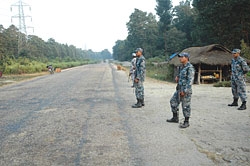|
|
In one fell swoop, the political landscape changed last week. Mahant Thakur and others quit their parties, and now there are few madhesi leaders committed to the present process. They are all taking to the streets.
Thakur leaving the NC is a wakeup call for Prime Minister Koirala. He is a clean man, respected and a committed kangresi. Thakur walking out reflects the tightrope act that moderate madhesi leaders have been walking this past year.
They could no longer defend the indefensible, the state's dismal track record in respecting madhesis, its security failures. Madhesi leaders realised the way to build or sustain a political base was by getting back to tarai towns and villages, rather than being near Singha Durbar.
And there was, let's not forget, encouragement from India which was angry at major parties for extending the stalemate and dragging their feet on elections. Upto now, Delhi had treated the madhes as an irritant to the larger process. But it has now backed this new madhesi front, hoping that will put pressure on Kathmandu politicians to either announce election dates or face the prospect of even greater loss in the tarai.
India's use of the madhes card is already showing results: negotiations have picked up momentum and the likelihood of an agreement this weekend has increased. Delhi's other motives include countering the perception among madhesi leaders that India has been unhelpful, and deflecting internationals angling to get involved in the tarai. As it pursues this fresh initiative, India would do well to remember that this has the possibility of unleashing a wave of instability which will be difficult to restrain. It should not overestimate its leverage if it thinks it can get all the madhesi forces back in the process the day it wants.
The new madhesi front is not just an Indian prop, however. It underplays the potency of domestic factors and exposes the hypocrisy of leaders who criticise Indian meddling while cravingly submitting themselves to Lainchaur. Neither is it accurate or helpful to dismiss the group as secessionist. In a context where national parties have failed to accommodate aspirations, regional parties strengthen and deepen democracy.
Thakur and company have the potential to revive politics in the plains and give the tarai a semblance of organised leadership that it sorely needs. Finally, politicians of different hues, some of them discredited, have taken up the political agenda of the madhes. This will marginalise the fringe and criminal outfits. A consolidation of madhesi forces is likely, with more MPs resigning and a possible understanding between the new front and other madhesi forces, especially the ones led by Upendra Yadav, Goit and Jwala Singh. All have welcomed the new front. Enormous challenges lie ahead for both the state and madhesi leaders. The natural impulse of Koirala and the Maoists will be to try to divide and conquer by engineering splits among madhesis, encourage Tharus to oppose the front, and go in for more aggressive security operations. This will be myopic.
A better way would be to resolve the present deadlock, open channels with all madhesi leaders, implement promises, announce election dates, and try to bring everyone back into the process. India, in turn, must back this kind of accommodation. How the state responds will determine the mood in the plains.
Madhesi leaders need to be responsible as well. Instead of rabble-rousing and escalating the rhetoric to a point of no return, they should have a coherent agenda, limited goals for now, and keep in mind national priorities. Their movement must demand madhesi rights and immediate concessions, but also keep in mind that elections are the most legitimate way to achieve aims like a federal unit.
It should learn from the MJF's mistakes and focus on organisation building to ensure that a maximum of madhesi representatives can reach an elected assembly. They must get the militants to lay down arms rather than abetting radicalisation and advocating violence. In a nascent democracy, political polarisation along solely ethnic lines is fraught with danger.




